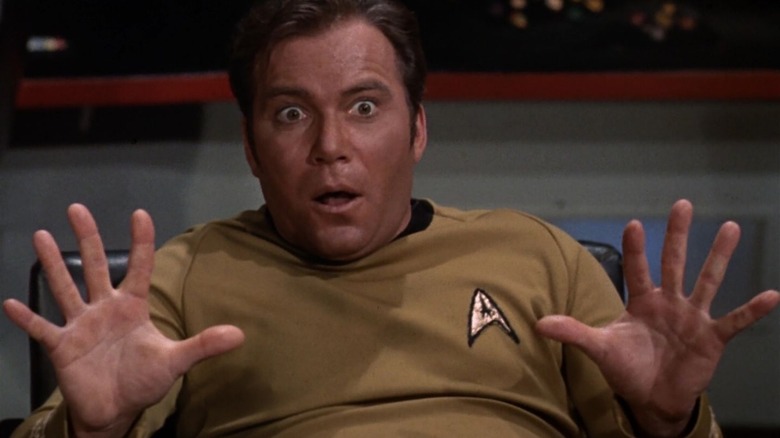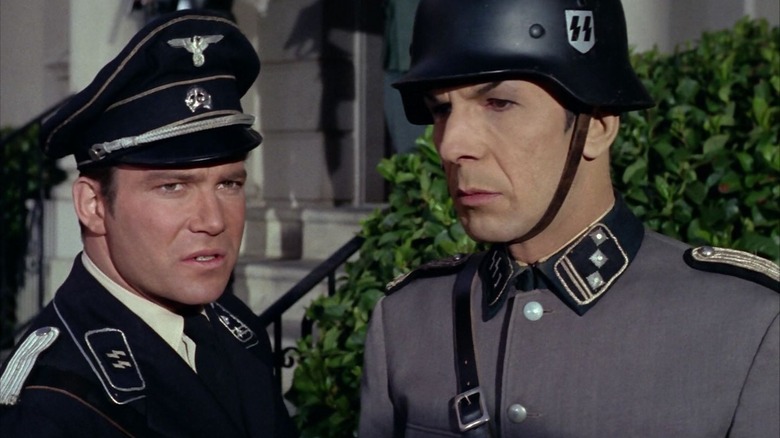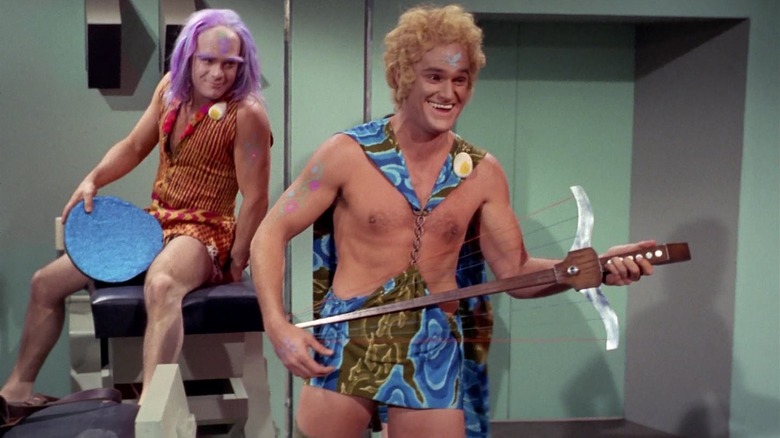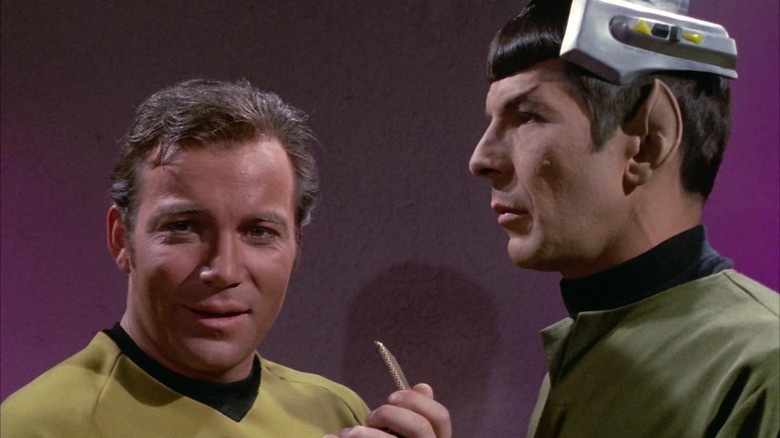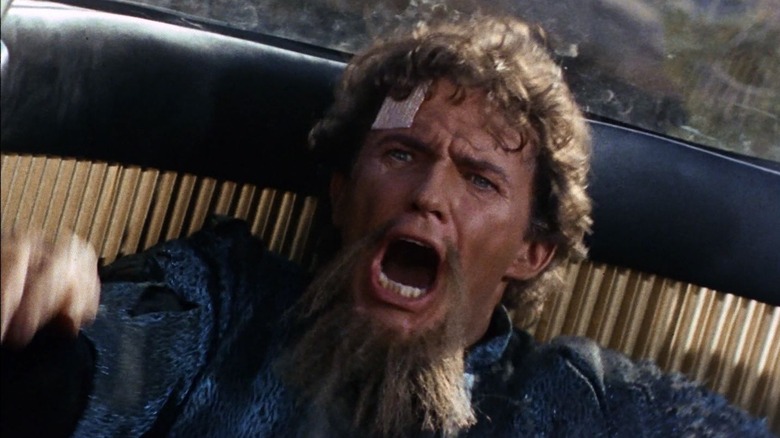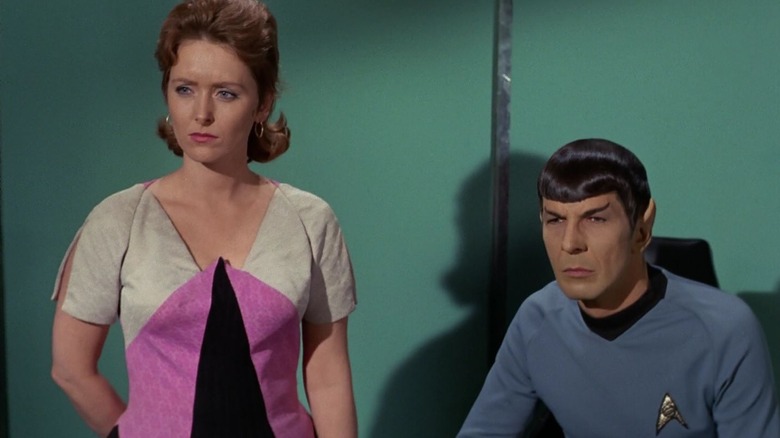The 5 Worst Episodes Of Star Trek: The Original Series, Ranked
In the "Futurama" episode "Where No Fan Has Gone Before" (April 21, 2002), the hapless Fry (Billy West) learns that "Star Trek" has been banned in the 31st century. He visits the severed head of Leonard Nimoy, kept alive in a jar of fluid, hoping to learn more about the fate of "Star Trek." Nimoy, knowing about the ban, initially pleads ignorance. Fry, trying to remind him, describes "Star Trek" as a 1960s TV that had "76 episodes. About 30 good ones."
Nimoy eventually confesses to remembering "Star Trek," but Fry's description of the show's quality isn't wholly unfair. Gene Roddenberry's original "Star Trek" series had many highs, providing popular sci-fi with some of its most indelible images. Additionally, its vision of a country-less, money-free, diplomacy-forward, anti-colonialist future inspired many to be optimistic about things to come. But it can also be true that the show churned out more than its share of stinkers. "Star Trek" is a cultural phenomenon, yes, but even deep-cut Trekkies will admit that it could get incredibly silly, and even downright absurd, when given the chance.
All the popular criticisms of the show — its low budgets, its tendency toward hippie-free-love nonsense, its 1960s overacting — are legitimate. Trekkies, you might find, are often willing to admit and even lambaste the show's weaker episodes. We can love something at the same time we prod it.
In that spirit, here are the five worst episodes of the original "Star Trek." And, boy howdy, are some of these terrible.
5. Patterns of Force
In "Patterns of Force" (February 16, 1968), the Enterprise arrives at the planet Ekos looking for Professor John Gill (David Brian), one of Kirk's old history teachers at Starfleet Academy. Kirk (William Shatner) and Spock (Leonard Nimoy) beam down to Ekos to find that it has adopted the politics and the uniforms of Nazi Germany. The Ekosians have targeted a nearby planet called Zeon for extermination and use the language of Adolf Hitler as their excuse. Kirk and Spock also find that John Gill has been selected as the planet's Führer.
When Kirk and Spock finally confront Gill at the end of the episode — with help from a local resistance — the Führer explains that he crash-landed on the planet and found it overrun by chaos. As a history professor, he decided to deliberately set up a fascist government, feeling that it was the most efficient form of government humanity had ever devised. Kirk convinces Gill to renounce the Nazism he espouses and declare peace with Zeon.
It's hard enough watching "Patterns of Force" knowing that the show's two Jewish leads were asked to wear Nazi uniforms. It's harder still, however, to accept the show's premise that Nazism can be looked at objectively and positively. The show is clearly trying to criticize the people who, in the 1960s, tried to argue that Nazism was a fine way to govern, were it not for all the genocide. It's so mawkish and gentle, however, that the criticism has no teeth. Ultimately, "Star Trek" argues that we all just need to get along, not addressing the insidiousness nor the violence of actual genocidal regime. The "can't we all just get along" conclusion feels childish. The episode was banned in Germany for years.
4. The Way to Eden
Gene Roddenberry's vision for the future featured a strange contradiction. "Star Trek" was set in a military-run future, wherein Starfleet adhered to a strict code of conduct based on rank, rules, and regulations. The only difference between a modern navy and Starfleet was that the latter wasn't devoted to military conquest. What if, Roddenberry thought, all of our military technology was devoted to exploration, humanitarian missions, and peace? In order for such a system to work, Roddenberry felt, strictness and propriety were key.
At the same time, however, Roddenberry openly advocated for free love and peacenik-inflected hippie idealism. He loved the ideas of sexed-up hippie chicks singing to music and just hanging with the scene, man. If free love was involved, you can bet that the notoriously randy Roddenberry was an advocate.
Those two concepts — military rigidity and hippie freedom — clash in "The Way to Eden" (February 21, 1969), one of the most obnoxious episodes of the show. A group of music-loving hippies beam on board the Enterprise after their own ship is destroyed, saying they're looking for a planet they call Eden. They eventually take over the ship and make it to Eden. However, the planet, perhaps predictably, isn't as Edenic as its name would have you believe.
It's annoying how smug both sides — the hippies and Starfleet — become when discussing their respective philosophies, and no one comes across as sympathetic. What's more, the hippies are absurd and their music takes up way too much of the episode. One might only find a thrill in seeing the stern Charles Napier in the silliest frock ever worn by a "Star Trek" actor. And that's saying something.
3. Spock's Brain
"Star Trek" never had the highest ratings, and at the end of its second season, NBC was poised to cancel the series outright. If it hadn't been for a concerted letter-writing campaign by ultra-fan Bjo Trimble, "Star Trek" wouldn't have gotten a season 3. It's a good thing that "Star Trek" got a third season, too, as it forced the show over the threshold for syndication. Once it was in syndication, the series found its true audience.
But, golly, when "Star Trek" fired up its third year, things didn't seem promising. The first episode of the season was "Spock's Brain" (September 20, 1968), a truly childish episode that wouldn't have felt out-of-place as a "Scooby-Doo" story. An alien invader infiltrates the Enterprise and surgically removes Spock's brain. Spock's body is still alive, though, so Dr. McCoy (DeForest Kelley) is able to outfit his skull with a remote-controlled machine that allows others to pilot him like a zombie robot. Kirk and co. eventually discover that Spock's brain has been plugged into a massive computer on a distant planet and is being used to regulate the food and environment for a species of dolts. A learning machine, looking like a colander, teaches McCoy how to reinsert Spock's brain.
"Spock's Brain" is whimsical in a way no one wants "Star Trek" to be, and I say that as a fan of "Star Trek: Lower Decks" and "Star Trek: Strange New Worlds." The premise is absurd and the technology is ridiculous, even for the ordinarily wild "Star Trek." In short, "Spock's Brain" is just silly.
2. The Alternative Factor
A lot of bad "Star Trek" episodes boast bad writing or strange conceits, but "The Alternative Factor" (March 30, 1967) is the only episode that is downright incompetent. In the episode, Kirk and co. encounter a mysterious space traveler named Lazarus (Robert Brown) who seemed to spontaneously blink into existence. Lazarus, it appears, is Brigadooning in and out of our dimension, and causing the fabric of space-time to rip. Lazarus periodically slips into an eerie dimensional passageway on his way back to his home dimension. When he passes through, however, he encounters a parallel version of himself, and the two Lazaruses briefly fistfight.
The interdimensional fights are realized through loud banging and a lot of oversaturated photographic effects that are unclear and difficult to comprehend. After each fight, Lazarus A is replaced by Lazarus B. They're impossible to tell apart, however, as they both sport similar glue-on beards.
There's some highfalutin dialogue about how a mix of matter and antimatter will destroy both universes, but it never much makes sense. The episode is sluggishly paced and its script is nonsense. This is not an interesting exploration of doppelgängers, parallel universes, or even human drama, it's just a bunch of sound and fury. Lazarus isn't a memorable hero or villain, and it's hard to tell if one was meant to be "good" and the other "evil." By the end of the episodes, the two Lazaruses are trapped in their pocket dimension, forced to fight forever. No one much cares.
1. Turnabout Intruder
It's a pity that the worst episode of "Star Trek" is its final episode. "Turnabout Intruder" (June 3, 1969) is a body-swap episode wherein a bitter villain named Dr. Janice Lester (Sandra Smith) uses an eerie technology to trade minds with Captain Kirk. As Kirk, she tries to take over the Enterprise, even though she seems uniquely ill-equipped for the task. Meanwhile in Lester's body, Kirk has to convince people that his body has been usurped.
Dr. Lester, the episode explains, wants to inhabit Kirk's body because, sigh, women aren't allowed to serve as starship captains. It's odd and disheartening that "Star Trek" would think to introduce this sexist conceit in its final episode, and Trekkies tend to ignore any canonical implications.
But to make matters worse, "Turnabout Intruder" goes well out of its way to show that women aren't capable of being good captains. Dr. Lester is depicted as impulsive, egotistical, hysterical, and too emotional to serve. She only wants to be a captain through sexist resentment, and her ambition is seen as wicked and misguided. She cackles and orders her crew to be put to death. Like Lady Macbeth, she aims to "unsex" herself.
For a series that had a tendency toward progressive ideas, "Turnabout Intruder" is as regressive as they come. And with it, "Star Trek" sailed away. It's a good thing it would eventually return to wash the taste out of our mouths.
